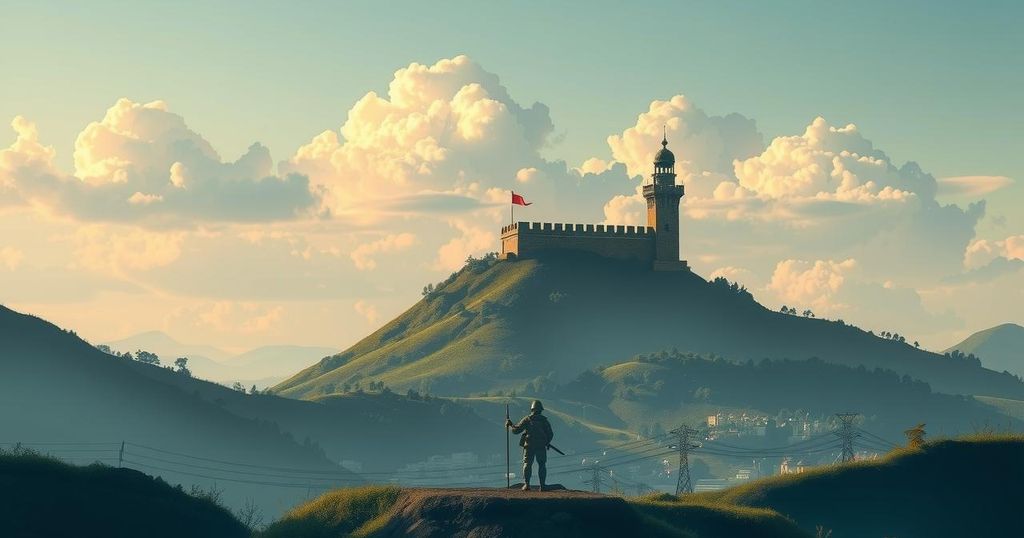M23 rebels have significantly fortified their control over Goma in the DRC, marking a dangerous escalation in an ongoing conflict. The recent clashes resulted in numerous casualties while humanitarian organizations alarmed over the worsening crisis facing the local population. International calls for ceasefire and dialogue suggest urgent interventions for conflict resolution.
Rwanda-supported M23 rebels have strengthened their hold on Goma, the largest city in eastern Democratic Republic of the Congo (DRC), representing a significant setback for the Congolese army and escalating a prolonged conflict that has resulted in numerous fatalities and mass displacement. On Sunday, M23 fighters entered Goma, claiming control by Monday, after three days of clashes that resulted in over 100 deaths and nearly 1,000 injuries among civilians and military personnel.
Although combat has diminished in the city, sporadic gunfire persists in Goma’s outskirts. Bertrand Bisimwa, the head of M23’s political wing, stated on X that their fighters are working to eliminate the remaining insecurities in Goma. Local media report that M23 forces, supported by Rwandan troops, now control the airport and most of the city.
Local residents described Goma as eerily quiet following the heavy fighting, with once-busy streets now largely deserted. Vincent Karega, Rwanda’s ambassador, indicated that M23’s operations would extend beyond Goma unless a peaceful dialogue with the Kinshasa government is achieved.
Reports indicate that M23 forces may be advancing towards Bukavu, South Kivu’s capital. Humanitarian organizations have expressed grave concern regarding the humanitarian crisis unfolding in Goma, anticipating mass displacement, severe food shortages, and a spike in disease outbreaks due to the ongoing conflict.
Healthcare facilities, like Kyeshero Hospital, are grappling with an influx of casualties, reported incidents of looting, and attacks on medical staff. The International Committee of the Red Cross has sounded the alarm on the devastating effects of the violence on civilians, stressing the need for humanitarian access to basic necessities.
International calls for a ceasefire have emerged, with the US and Europe urging Rwanda to cease its support for M23. During a recent conversation, US Secretary of State Marco Rubio and Rwanda’s President Kagame discussed the urgent need for a ceasefire and resolving the war’s underlying issues. DRC President Felix Tshisekedi, however, will forgo an emergency meeting with Kagame, opting instead to address the nation regarding the unfolding events.
As fighting persists, citizens of Goma continue to face dire circumstances, compounded by electricity outages and internet disruptions. The International Crisis Group has emphasized the urgent necessity for negotiation to prevent the conflict from further escalating, suggesting a potential solution involving M23’s withdrawal from Goma and the establishment of a different peacekeeping force to manage the city temporarily during discussions.
The situation in eastern DRC, particularly in Goma, has been volatile, dominated by the actions of the Rwanda-backed M23 rebels. The resurgence of the M23 group, claiming to represent the interests of the Tutsi population in DRC, stems from longstanding tensions and past conflicts, most notably their seizure of Goma in 2012. This recent outbreak of violence has reignited fears of a broader regional conflict as humanitarian crises unfold, prompting international attention and calls for resolution.
The ongoing violence in Goma reflects a complex interplay of local and international dynamics, with grave humanitarian implications. The seizure of Goma by M23 presents substantial challenges to peace and stability in the region, necessitating urgent diplomatic efforts for a ceasefire. Continued advocacy for humanitarian access and protection of civilians is critical as the international community navigates the complexities of this multifaceted conflict.
Original Source: www.aljazeera.com






